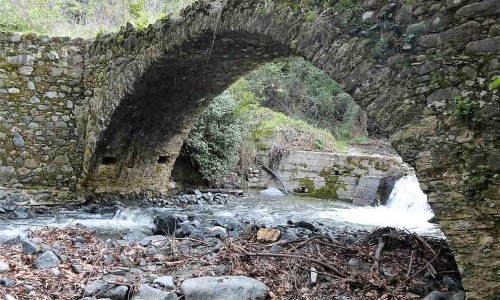Trimiklini Double Bridge
Tucked deep in the rolling hills of the Troodos foothills, near the village of Trimiklini, lies a blend of engineering marvel and cultural heritage: the Trimiklini Double Bridge. Built at the turn of the 20th century, this twin-arched stone structure spans a gently winding river coursing through the mountainous landscape. It’s a place where nature, history, and rural life intertwine, offering visitors a serene journey through time and terrain.
A Bridge Steeped in Heritage
The two parallel arches were constructed side by side, serving both ancient mule tracks and modern horse‑drawn carts. Their solid stonework and graceful curves speak to traditional craftsmanship and practical engineering. Built of local stones, the bridges blend naturally into the surrounding valley—a quiet reminder of how structure and setting can coexist.
With one arch used for incoming traffic and the other for outgoing, the Double Bridge enabled reliable passage through seasonal flooding and ensured connectivity between Trimiklini and nearby villages. The design reflects a thoughtful solution to the region’s geography—a wise balance of beauty and purpose.
Wandering Along the Water
The double bridge is surrounded by gently flowing water—especially during the cooler months when the river swells from mountain rains. A few meters downstream, the current widens into a shallow pool, where local children splash, stones rest on the riverbed, and reflections ripple across the surface.
Crossing the bridge by foot is a delicate delight. Each arch creates a subtle echo when footsteps fall, and looking through the opposite archframes, you glimpse green slopes and golden sunlight filtering between branches. The sound of water beneath mingles with chattering cicadas or birdsong overhead—rhythms of rural Cyprus alive in stillness.
Meandering trails follow the river’s edge, shaded by tamarisk and eucalyptus. Wildflowers edge the banks in spring, while autumn brings golden browns and quiet rustles among dried grasses. It's a peaceful spot for quiet reflection, drawing leisurely visitors, photographers, and anyone looking to escape noise in favor of soft soundscapes.
A Bridge That Connects More Than Land
The vicinity of the Double Bridge also offers cultural richness. Close by, you’ll find the never-opened summer church—a tiny local chapel built of stone with a simple wooden door and a bell that hardly rings. Though seldom in use, it feels like a living relic of rural tradition and quiet devotion.
Villagers occasionally cross the bridge en route to vineyards, olive groves, or almond orchards above. In the harvest season, baskets of fruit load tiny mule-drawn carts, and the bridge hums with soft activity. In winter, mist hangs over the water, and shepherds guide flocks above in pursuit of greener pastures.
Who Is Drawn to the Double Bridge?
The Trimiklini Double Bridge appeals to travelers who love:
- History and old engineering that feels lived-in rather than on display
- Nature walks in undisturbed valley settings
- Photographers seeking reflective water, stone architecture, and mountain light
- Hikers or day-trippers exploring the Troodos foothills
- Cultural wanderers who appreciate relics of rural Cyprus without the crowds
It’s most rewarding as part of a countryside route, whether you're passing between Platres and mountain villages or simply carving out an hour of peaceful discovery close to nature.
Tips for a Memorable Visit
- Wear sturdy walking shoes—the path around the bridge is natural and uneven.
- Visit in spring or autumn for mild weather, flowering wild herbs, and dramatic views.
- Bring a picnic, blanket, and camera—this is a place made for lingering.
- Mind the seasons—in dry summer months the river may fall to a trickle; in peak winter it may swell beyond where you can comfortably cross.
- Pair your visit with nearby hiking trails or stops in nearby villages like Mandria or Trimiklini for traditional coffee shops or local snacks.
The Trimiklini Double Bridge is more than just a crossing point—it’s a quiet sentinel in a valley where time moves gently, where craftsmanship and water play together in harmony. It doesn’t shout for attention. Instead, it welcomes visitors who step softly across its arches, and leaves them richer for having discovered a piece of Cyprus both poetic and grounded.
Whether you stay a moment to watch light dance across flowing water or wander farther to olive groves and vineyards beyond—this bridge remains a quietly powerful reminder that beauty and calm often lie in small things made with care.








